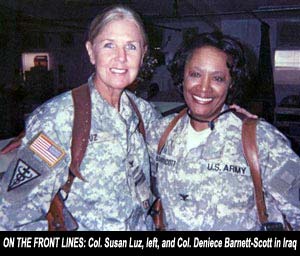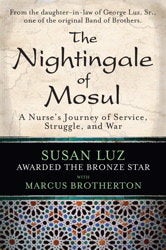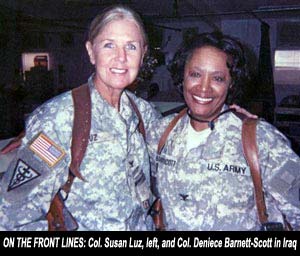
KINGSTON, R.I. – July 26, 2010 — Those who complain about hot and sticky weather might be a little less vocal after reading about Susan Luz’s experiences in Iraq when the mercury hit 149 degrees.
Others who drone on about the injustices in their lives might be interested to learn about Luz as a young University of Rhode Island nursing alumna who was raped and beaten while in Brazil with the Peace Corps. Rather than leave the country and return home to heal in Rhode Island, she recovered physically and emotionally in Brazil and returned to her village to complete her assignment.
These are a few of the experiences of a nursing professional, Peace Corps volunteer, retired U.S. Army colonel, wife and author.
“I wasn’t from a family of quitters,” Luz writes, referring to her father, a decorated World War II veteran, and her father-in-law, the late George Luz Sr., whose wartime experiences were captured in the miniseries, Band of Brothers. “That’s what I convinced myself of anyway. I truly did want to go back and finish my Peace Corps mission (bringing health care and midwifery services to a rural village). If I didn’t finish what I had started, then it would have undercut any work I had already done there, and if that foundation was blown out from under me, well, then that would have made the assault even harder to bear.”
Luz offers many more insights and details of her adventurous life in The Nightingale of Mosul, A Nurse’s Journey of Service, Struggle and War. The 243-page story of the native Rhode Islander was released in the spring by Kaplan Publishing, New York. Marcus Brotherton was her collaborator.
The retired colonel was the highest-ranking woman in the 399th Combat Support Hospital, an Army Reserve unit based in Massachusetts. In 2006 at age 56 Luz was deployed to Iraq during the American surge operation.
Strong URI foundation
In laying out the path that led to the Army Reserve, Luz discussed her pivotal days as a URI nursing student.
“We used to leave at 5:30 a.m. from Kingston to get to our clinical work in the (Providence) hospitals,” Luz said. “My favorites were psychiatric and community health nursing.
“The teachers were really great, and I certainly didn’t see URI as party school, especially in nursing. With our clinical rotations and class work, we didn’t have time for much socializing. URI was one of the top rated nursing schools in the nation.”
After a clinical rotation at Rhode Island’s Institute of Mental Health and public health experiences, Luz realized she did not want to work as a medical-surgical nurse in one of the major hospitals after her graduation in 1972.
She wanted to serve as an army nurse in Vietnam, but her father stopped her from enlisting. Instead, she and her best friend and URI nursing buddy Donna (Tasca) Manion joined the Peace Corps and traveled to Brazil for their first assignment.
“I said, Come on, let’s go be adventurous’,” Luz said. “After all, everyone in our class said we were like Lucy and Ethel.”
At the time, the Peace Corps did not assign teams of workers to a village, so Luz and Manion went their separate ways. Only after Luz was brutally attacked in broad daylight did Manion rejoin her to help her recover and return to her mission.
After leaving the Peace Corps, Luz returned home and earned her master’s degree in public health nursing from Boston University in 1976. She returned to Brazil with Project Hope and then came back to Rhode Island where she took a job as a nurse-teacher at Central High School in Providence and ran its school-based clinic from 1978 to 2006. While working at Central, she also worked nights at the state Institute of Mental Health and then Gateway Healthcare’s Acute Residential Treatment Center in Johnston. She also found the time to join the Army Reserves in 1983.
Twenty-three years later, Luz received a letter from the Department of Army notifying her of her unit’s deployment to Iraq for 15 months.
Duty in Iraq

“As a public health nurse, my mission was to keep our soldiers healthy and safe,” said Luz, who by that time had attained the rank of colonel.
While she had witnessed and been a part of violence in Brazil, at Central High School and the state hospital for the mentally ill, in Iraq she experienced the horror of unpredictable mortar attacks, the slow deaths of fatally wounded soldiers and children and injury to some of her closest friends. She was in Iraq in 2006 and 2007, the height of the U.S. surge and the bloodiest point of the war.
Still, her indomitable spirit led her to run desert cookouts and birthday parties to boost her unit’s morale, and health fairs and movie nights to help ease the burdens of serving in combat hospital settings. While a dedicated soldier-nurse, Luz didn’t let the formal trappings of the military stop her from getting the job done or from putting her charges first. Superiors said that Luz’s commitment to putting her soldiers and public health team first earned her the respect of all who knew her. At one point, she broke her arm, but still coordinated the barbecues and could be found flipping burgers and hot dogs on the grill.
She even opened a beauty salon on base to help build the morale of the women in the unit.
And it was Luz who had the task of comforting soldiers in their last moments of life. “My job during mass casualty incidents was to care for people expected to die.”
When she asked her supervisor why she got the job, her superior told her there was no one better. “That was the toughest job when you knew a soldier was going to die,” Luz said.
Two years after her return from Iraq, not a day goes by without her thinking about her time in a war zone. “The best part of it was being with my sisters, my own Band of Sisters. They were all my friends, my family in war.”
“I don’t dwell on it, but I can’t forget the injuries we saw. The faces. The lives. The people. In our year in the Mideast, our unit treated more than 30,000 wounded, endured 300 mortar attacks and handled 14 MASCAL (mass casualty) situations.”
A great life
Luz concluded her book saying that her life has been wonderful, with many others agreeing as she was awarded the Bronze Star. Through the war years, the Central High years and many other major parts of her life has been her husband, George, the love of her life for 25 years in August.
“My aim is always to give myself to the people I meet, to serve others in wholeheartedness,” she wrote. “Serving others has been my life’s priority, and the blessing has been mine. The more you give, the more you get. That’s the purpose I’ve found in life. That’s the nightingale’s song I always want to sing.”

